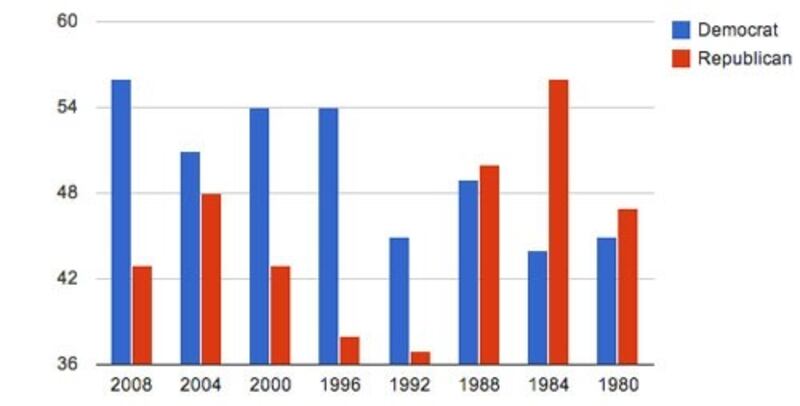
Reproductive health issues may have been given a national airing, but because of gridlock in Congress, most of the actual action in 2012 took place at the state level. I got a wide range of responses about which specific news event most stuck out in people's mind, but I'll focus on one because of the contrast in responses it generated between liberals and conservatives: Virginia's law mandating an ultrasound before an abortion. An earlier version of this law attracted controversy since had language which would have permitted the use of a transvaginal probe to achieve this.
Here is how the law was described by some liberals:
Virginia trans-vaginal ultrasounds. Particularly powerful story because it's such a graphic rape-like violation of women forced by male Republican politicians....
While the entire women's health debate has really riled me, the transvaginal ultrasound mandate for women seeking abortions in Virginia stands out as being the biggest story, and by far the creepiest. It's all the issues that women have with the GOP, rolled into one incredibly disgusting story. There are no real medical reasons for such a disgusting invasive procedure, other than a politically legislated guilt trip. It's basically mandating that a woman be raped while someone tells her that she's a murderer for not hearing a fetal heartbeat, as a result of her decision to have an abortion.
And now the conservative/libertarian take on same issue:
These laws are mostly just symbolic. Take the bill that was just passed in Arizona. As a woman, do I worry that I will now only have four full months to get an abortion, as opposed to five and a half? And would it really be that bad if I was offered a non-mandatory ultrasound one hour before that abortion? Yes, it is a bit disconcerting when legislators go poking around in women's health issues, but, fundamentally, these laws don't impact me. I would be tempted to stand with the Democrats on principle, but they are so shamelessly manufacturing outrage to pander to women, I can not feel good about throwing my lot in with them.…
Honestly? I get the left is outraged, but I lose any sympathy for them when they start screaming that those state-level bills are just part of a war on women. In the case of the Virginia law - not only are they arguing something I think doesn't exist (the war on women), they're letting politics interfere with objective reasoning. I also just don't think the Virginia law goes too far (from my knowledge of it). It requires women to have an ultrasound 24 hrs before an abortion? Ok ... how many times have I heard a Democrat argue that even though they're pro-choice they still want to reduce the number of abortions in this country? A ton. The law doesn't come close to banning abortions. But if it happens to prevent a few, why would anyone say that's a bad thing?
Also because I find the outrage hypocritical. This is why I can't stand either parties. In this case, the left wants the government to be able to mandate health insurance and contraception coverage … but not ultrasounds?
The fact that the details of the Virginia law sound different in the liberal and conservative responses should not be surprising. Liberals are thinking about the first bill proposed in Virginia when they talk about the transvaginal probe. The revised bill which ultimately passed did not mandate that sort of ultrasound. In this case, if there was overreach, the legislature did ultimately pull back to the more familiar contours of the abortion debate: mandatory ultrasounds might deter abortions? That's the whole point!
I should include a notable dissent from a pro-life conservative who did argue that the state-level laws were a tactically bad idea:
I find them [state-based-initiatives] infuriating because they're a) a distraction and b) not actually helping anyone. I'd prefer we talked about issues like increasing tax benefits for adoption or encouraging private charities to give college scholarships to pregnant young single women. These personhood/ultrasound bills only make the GOP/pro-lifers seem radical and detached from reality -- restricting access to abortion doesn't solve the demand issue. Personally I think there should be ultrasounds beforehand (would love to see a study done on percentage of women who change their mind after having one -- don't think one has been done though) but I don't think that's what we should be wasting our political capital on.
But note that despite the personal uncomfortableness with the timing and efficacy of the laws, the use of an ultrasound is not rejected.
A similar divide was present over Mitt Romney. Liberals, unsurprisingly, are generally skeptical of Romney:
Mitt Romney is all over the place - if I could trust him to be Massachusetts-Romney, I might be okay with him, but he seems to bend to wherever he thinks the political winds are blowing. He supports and rejects Planned Parenthood, he supports and rejects individually mandated health coverage, he supports and rejects the Blunt amendment - the man seems to have no opinions of his own. …
Romney hasn't been directly part of any of these stories. Honestly, he might have escaped some ire because of how atrocious Santorum has been. However, if Romney disagrees with any of the above stories (and plenty more like them), he hasn't said so loudly enough. The impression that I have is that Romney tacitly endorses these actions or at least isn't willing to stand up against them, and to me that is entirely unacceptable.…
At first, however, these stories didn't really affect my view of Romney himself. My view of Romney then (and still now, sort of) is primarily that he was a wealthy, out of touch moderate having to pander to an evangelical base --- an inevitable part of campaigning. But stories such as this (especially the disturbing anecdote about Carrell Hilton Sheldon) have made me question just how "moderate" he really is as regards women's issues. Needless to say, there was never any chance of me voting for Romney --- but less because of my objections to him himself, and more because of what his party continues to advocate: a frankly archaic view of an American society where women's dignity and basic rights are marginalized.
The conservatives and libertarian responses I got led me to suspect that they will eventually rally to him for the sake of the election, even if they are not enthusiastic about it:
None of these stories have changed my view of Romney. I don't see these stories as anything more than partisan bickering. I don't honestly think that men as educated as Romney and Obama hate women, and these social policies affect me far less than economic policies. I'm impacted by what the marginal tax rate is set at. I don't work for a Catholic institution, I can afford my own birth control, and I don't really care what ideas about pornography are held by a man that is no longer running for President.…
This is a guy [Romney] who has been successful in every area of his life: successful businessman with a successful and loving marriage, who raised five exceptional sons who have all gone on to marry and have children of their own. He has no ethical problems (that we know yet, I guess) there's no polarizing figure in his past, there's nothing that he's said or done that calls into question his ability, his reasoning and his love of country. (Again for all - that we know of!). I guess what I'm trying to say is that this guy appears to be an exceptionally clean politician. But women don't like him because ... he's not likable enough? Give me a break!
As long as one party has strong advocates who believe that Roe v. Wade should be overturned because it was a badly made judgement while the other does not, a partisan divide there is inevitable. That isn't new. Whatever concerns my conservative friends may have about how the GOP handled itself, at the end of the day, there is still an election to win in November.
But will that be enough for the GOP in November?
Republicans generally console themselves with the argument that even if Republicans do worse among young women, that they do better among married and older women. But will that continue if the current partisan split holds? Current trends suggest it might not:

I won't argue that the solution is some sort of concerted effort by Romney to explicitly target female voters. (Ramesh Ponnuru suggests some problems with that strategy here.) But simply alienating college educated women can't be a smart strategy or even part of the approach to politics from a political party that believes in being representative of the entire country.






